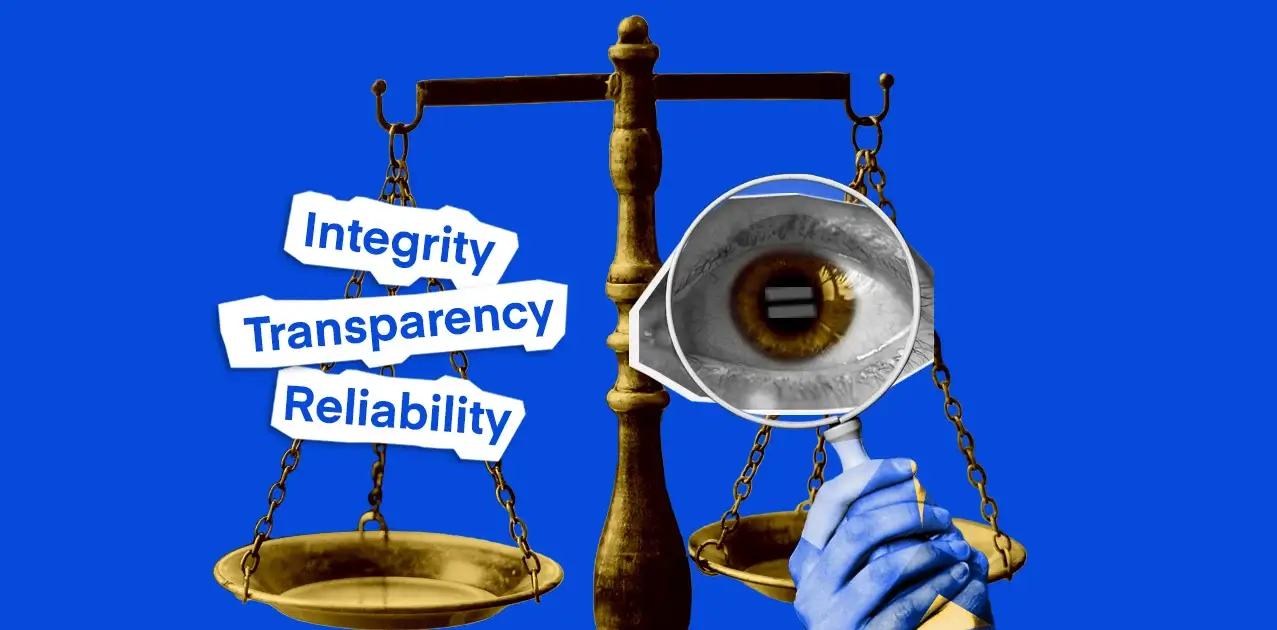It’s fairly common to talk about jobs from the perspective of what an applicant needs to do, but that doesn’t mean employers shouldn’t be held up to some standard of ethical recruiting.
In any scenario, a sense of ethics or guiding principles should guide your business practices, even during the hiring process.
With the knowledge that managers account for 70% of variance in employee engagement, imagine how many missed connections occur before you’re even fully staffed.
In other words, as much as people hate a bad boss, a bad recruiter or hiring manager is just as demoralizing.
Altogether, it’s imperative that your hiring procedures fall in line with ethical recruitment. Today, you’ll learn how to ensure that this is the case.
Are you ready to start your development project?
We have the developers you need to take your development project in the right direction.
Companies are proven to grow their business faster with Trio.
What Is Ethical Recruiting?
Ethics refer to a set of moral standards that individuals and groups use to differentiate between right and wrong.
In business, ethical recruiting entails utilizing hiring practices that fall in line with an organization’s corporate values.
It may seem that business is all about getting the greatest return on investment. And in fact, for many corporations, this isn’t far from the truth.
But in reality, systems of any kind — whether that be a relationship or an organization — tend to fall apart when integrity, transparency, trust, and similar values are lacking.
When you’re looking to hire software developers, these values carry even more weight, since collaboration and communication are key to the craft.
Hopefully, your organization already has these values at heart.
However, if your recruitment process doesn’t reflect these values, you’re still falling short of competent business management.
And of course, with competent business management, comes long-term business scalability.
So if you want your business to grow beyond measure, ethical recruiting is a good start.
Some examples of ethical recruitment in practice include:
- Assessing candidates without discrimination
- Moving the hiring process forward in a timely manner with a steady cadence
- Communicating professionally and sincerely with job candidates
- Updating applicants about their candidacy for the role whenever and wherever possible
If you’re regularly incorporating these practices into your hiring process, you’re on the right track. But this is only the tip of the iceberg.
Without a doubt, hiring remote developers complicates the hiring process, meaning ethics should take the driver’s seat in every interaction you have with a candidate.
Why Is Ethical Recruiting Important?
Often, doing the wrong things is far easier than doing what’s right. That said, actions have consequences.
To stress the importance of ethical recruiting, it might be helpful to learn exactly how unethical behaviors can lead your business astray.
Reputation
While it may seem like you have all the power, unethical behaviors put your reputation at risk. And ultimately this can jeopardize your entire company.
Turns out word of mouth is actually an incredibly productive means of spreading information. Combine that with the social media of the modern-day, and almost no news goes unheard.
When you employ ethical recruitment practices, one of two things can happen:
a) the public hears good things about your business
b) the public hears nothing at all about your business
Though the latter option is a bit disappointing, both outcomes are extremely good for your business.
But if you’re hiring process leaves a bad taste in a chatty mouth, you can almost guarantee everyone will hear about it.

‘There’s no such thing as bad PR’, is a rallying cry for B-list celebrities, not businesses.
Relationships
What’s more, building meaningful relationships with job candidates is just as important as fostering working relationships with the people already on your team.
Someone doesn’t have to be working for you or with you to have an impact on business.
For instance, what if you found the perfect candidate for the job.
Yet, your respect and appreciation for the candidate’s time and energy weren’t quite up to par.
Well, your potential hire is completely within their right to decline an offer based on your hiring practices.
To boot, even applicants who don’t make the cut can be valuable connections for the future.
Instead of hitting two birds with one stone, you’re swerving qualified candidates and invaluable networking relationships by failing to implement ethical standards.
Hiring Efficiency
Given ethical recruiting, all candidates get the same hiring process across the board.
Naturally, in absence of a systematic approach, hiring can get a bit sloppy.
Without a consistent method of reviewing and selecting candidates, you end up foregoing essential skill assessments and making quick judgments rooted in bias.
When it comes to hiring software engineers, effective hiring requires an in-depth look at both the technical skillset of the candidate as well as their interpersonal skills.
Unfortunately, nepotism, favoritism, and prejudice among other factors, sometimes muddy the waters.
In the end, you’re left with a hire who checked every box save the ones that would benefit the software project and development team as a whole.
Examples of Unethical Hiring Practices
The thing about ethics is that what’s legal and what’s right don’t always line up. So to make sure you’re not wildly off-target as far as ethical hiring goes, here’s a list of what you shouldn’t do.
False Advertising
False advertising goes beyond catfishing on dating apps.
A common ruse in hiring practices is for employers to write a misleading job description.
The job may very well exist, and maybe the day-to-day expectations listed are correct too.
But they’re probably paying way less than they claim. And the benefits they’re advertising are likely a falsehood too.

Word of advice: don’t do this.
It doesn’t matter if you’re looking for a front-end developer or a burger flipper. Dishonest recruiting just wastes your and the candidate’s time.
Expiring Offers
This next one is something you’ve seen mirrored in everything from your favorite fast-food joints to your social life — FOMO.
Yes, fear of missing out is real, and that fear turns into internal resentment when you find out you really did miss out.
A limited McRib run is one thing, but missing out on a great job opportunity is plenty to mad about.
This is why recruiters sometimes tell applicants that they have expiring offers, hoping the pressure the candidate into taking the job without forethought.
Although there is a timeline for hiring, it’s usually not nearly as urgent as an unethical recruiter would make it out to be.
In these schemes, a candidate might only have until the end of the day to accept an offer, as opposed to the traditional 48 to 72 hours.
For your sake, avoid putting undue pressure on potential hires.
Name-Dropping
The temptation to talk about that one time you met a famous person lurks silently in every conversation.
Luckily, at this point, you’ve learned to hold your tongue. You should do the same in your hiring process.
Many recruiters will go out of their way to mention a famous company or person that their organization is working with.
Only later does the candidate learn that this relationship isn’t as tight-knit as the recruiter suggested. For what it’s worth, if your company genuinely outsources development for Mark Zuckerberg, that’s worth mentioning.
On the other hand, if you’re just using the same tech stack as Facebook, don’t make connections where they don’t exist.
4 Tips for Ethical Recruiting
Having seen the bottom of the barrel in recruiting practices, you should take a look at how ethical recruiting manifests.
Note that these tips extend from the most standard ethical practices disclosed earlier, such as equal treatment amongst candidates and sustaining a practical hiring velocity.
These guidelines are more specific but equally essential.
1. Disclose all the details.
You should use interviews to disclose all the important details of the job.
Proper matching can only happen when both parties have all the info they need to navigate the hiring process effectively.
That means not only do you have sufficient information about the candidate to select the best applicant, but the candidate must fully understand what the organization is and what the job involves.
2. Only request the necessary information.
Do not ask candidates about their private information unless it somehow impacts their ability to do the job.
Relating to a candidate about some niche coincidence like having grown up in the same town sounds like friendly banter.
Alas, getting too close can quickly turn to implicit bias on your part, when you find their age, religion, or some other characteristic isn’t what you expected.
Keep in mind that asking for salary history, while common in many hiring processes, can also unwittingly put the candidate at a disadvantage, particularly women.
3. Maintain confidentiality on candidate information.
What a candidate tells you should never reach others’ ears without permission.
The reasons for this should be self-explanatory, but it also helps to build trust between you and the candidate.
You wouldn’t want a stranger telling all their friends your business, would you? Common sense takes the cake here.
4. Inform candidates of the selection decision date.
Give the candidates a time frame for when they should hear back about your decision.
Sadly, it’s commonplace to leave eager candidates hanging, but this is a horrible way to show that you care about an applicant’s time.
Even automated email updates suffice. Just let them know what’s what.

Elevate Your Team with Trio AI Talent
Empower Your Projects with Trio’s Elite Tech Teams
Ensure Ethical Recruiting with Trio
Using ethical hiring practices isn’t as simple as being polite. It relies on careful consideration of the numerous factors that influence the hiring process.
In general, hiring has always been a long and exhausting process with more than a few nuances to account for.
This is why companies like Trio exist. We seek to relieve you of any administrative duties where hiring is concerned.
We’ll give you a team of highly qualified, experienced software developers who meet your needs and then some.
Trio offers unparalleled software wisdom and access to Latin American developers. Meet our elite Argentinean developers, Colombian developers, and Brazilian developers for outsourcing excellence.
Hire developers at Trio to stop searching and start developing!







